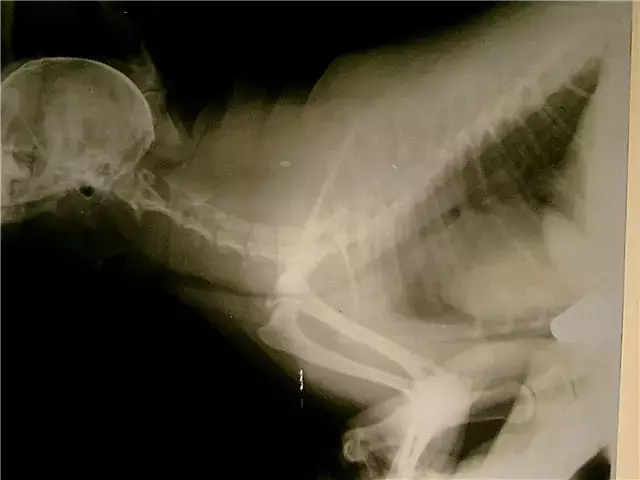- Author Rachel Wainwright wainwright@abchealthonline.com.
- Public 2023-12-15 07:39.
- Last modified 2025-11-02 20:14.
Pimidel
Instructions for use:
- 1. Release form and composition
- 2. Indications for use
- 3. Contraindications
- 4. Method of application and dosage
- 5. Side effects
- 6. Special instructions
- 7. Drug interactions
- 8. Analogs
- 9. Terms and conditions of storage
- 10. Terms of dispensing from pharmacies

Pimidel is a uro-antiseptic, an antibacterial agent from the quinolone group.
Release form and composition
Available in the form of capsules: gelatinous hard, opaque, two-color, with an ivory body and a dark green cap; content - partially lumpy powder from white to white-yellowish color (in a cardboard box 2 blisters of 10 capsules).
Active ingredient: pipemidic acid, in 1 capsule its content is 200 mg.
Auxiliary components: anhydrous colloidal silicon dioxide, magnesium stearate, sodium starch glycolate, lactose monohydrate.
Indications for use
Pimidel is intended for the treatment of infectious diseases of the urinary system (acute and chronic) caused by flora sensitive to pipemidic acid, including:
- Cystitis;
- Urethritis;
- Pyelonephritis;
- Prostatitis.
For preventive purposes, the drug is prescribed to prevent the development of infectious processes during instrumental interventions, including catheterization and endoscopy.
Contraindications
Absolute:
- Organic lesions of the central nervous system;
- Severe liver dysfunction;
- Severe renal dysfunction (creatinine clearance less than 60 ml / minute, serum creatinine more than 265 μmol / l);
- Infections caused by pathogens resistant to pipemidic acid;
- Childhood;
- Pregnancy and breastfeeding;
- Hypersensitivity to any component of the drug.
Relative (conditions in which Pimidel should be used with extreme caution, after a careful assessment of the benefit-risk ratio):
- Anuria;
- Oliguria;
- Vascular spasms of the brain;
- Cerebral circulation disorder;
- Anamnestic data on cerebral hemorrhage;
- Convulsions;
- Impaired renal function;
- Elderly age (over 70 years old).
Method of administration and dosage
Pimidel is taken orally before meals.
The standard single dose is 2 capsules, the frequency of administration is 2 times a day (morning and evening).
In some cases, if microorganisms resistant to the drug are identified, the daily dose is doubled.
With staphylococcal infections, the interval between doses should not be less than 8 hours.
The average duration of treatment is 10 days, if necessary, the doctor can extend the course.
It usually takes 3 to 6 weeks to treat kidney disease, and 6 to 8 weeks for prostatitis.
Side effects
- Dermatological and allergic reactions: itching, rash, urticaria, photosensitivity with erythema;
- From the gastrointestinal tract: diarrhea, nausea and / or vomiting;
- From the side of the central nervous system: vertigo, headache, visual impairment, general weakness; in rare cases - peripheral disorders (manifested by muscle weakness and myalgia), hallucinations, psychosis and depressive disorders; extremely rare - large convulsive seizures.
Patients with glucose-6-dehydrogenase deficiency are at risk of developing hemolytic anemia.
special instructions
During treatment with Pimidel, the use of a large amount of fluid is indicated (under the control of diuresis).
Patients are advised to avoid quartzization and sun exposure.
When carrying out long-term treatment, an antibioticogram should be periodically performed, as well as the function of the kidneys and liver, and the picture of peripheral blood should be kept under control.
With observance of precautions, Pimidel must be used to treat patients with epilepsy.
Drug interactions
With the simultaneous use of pipemidic acid increases the concentration of caffeine and theophylline, slowing down their metabolism.
Analogs
Analogs of the drug Pimidel are: Palin, Pilamin, Pipegal, Pipemidic acid, Urotractin, Vero-Pipemidine, Uropimide, Pipem, Pipelin.
Terms and conditions of storage
Store in a dry place. Keep out of the reach of children. Do not exceed temperatures up to 25 ºС.
The shelf life is 5 years.
Terms of dispensing from pharmacies
Dispensed by prescription.
Information about the drug is generalized, provided for informational purposes only and does not replace the official instructions. Self-medication is hazardous to health!






